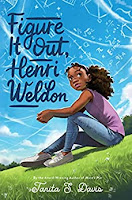Publication Date: January 17, 2023
Between the time I requested this arc on Netgalley and the time I received it, I forgot why I was interested in it. It was until I got to the end and saw a picture of the author that I realized that Figure It Out, Henry Weldon was written by my old blogging buddy, Tanita S. Davis. So to be open and above board, I kind of know the author. But I didn't realize that while I was reading this book, because evidently I don't pay attention to author names on covers.
Tanita has done a very nice job of creating a kids' book developed around children's problems. Henri Weldon has a learning disability specifically related to math. The issue is recognized by her family. In fact, until recently she attended a special school to address her disability. She's now getting ready to attend a traditional school where her problem is still recognized and addressed. This is not a child surrounded by uncaring adults left to fend for herself.
That's a big part of what I liked about this book. Because while Henri is supported, she still has problems. Which, sad to say, is life. Her problems are not those we often see in children's books, the problems adults value big time: Death, divorce, death, old age, death, illness, death, war, death, tragedies, and death. They are the problems that children have and that are important to them.
Problems Like:
- Getting lost in the new school building. Sounds minor, but isn't being unable to find a classroom a classic adult dream? What's that about, huh? Henri's struggles to get around made me anxious for young family members who will be finding themselves at new schools.
- Making friends. Not just in the sense of making any friends but making friends who will actually be friends for you. Minor? Then why are we always reading articles about how difficult it is for adults to make friends? It's not minor when it's us, is it?
- Sibling issues. The problem presented here is fantastic, because it's not about rivalry. It's about support. Should Henri be befriending someone who had a falling out with her sister, even bullied her?
- Parent issues. Not parents fighting or getting a new boyfriend but parents who have their own work and time problems that they are dealing with in addition to being parents.

No comments:
Post a Comment